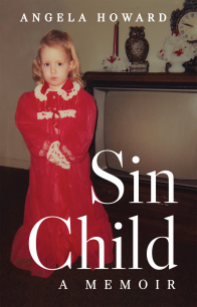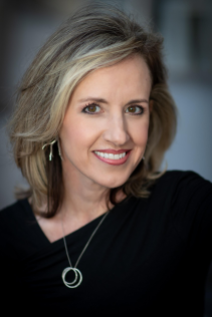Themes of survival, resiliency shine in Angela Howard’s immersive book
 Memphis, TN – Angela Howard recounts how she persevered through her traumatic childhood to come out the other side as a successful nurse, motivational speaker, educator and parent. “Sin Child” (March 31, 2020, Books Fluent) is the personal account of a strong-minded child who endured a daily struggle to find the smallest amount of acceptance and, many times, a place to fall asleep at night. Angela came to accept loss, abuse, and organized crime as a natural part of her life. The innocence and nostalgia of a one-traffic-light town fades too fast for the cotton-top child with a neglectful, angry mother and an absent father.
Memphis, TN – Angela Howard recounts how she persevered through her traumatic childhood to come out the other side as a successful nurse, motivational speaker, educator and parent. “Sin Child” (March 31, 2020, Books Fluent) is the personal account of a strong-minded child who endured a daily struggle to find the smallest amount of acceptance and, many times, a place to fall asleep at night. Angela came to accept loss, abuse, and organized crime as a natural part of her life. The innocence and nostalgia of a one-traffic-light town fades too fast for the cotton-top child with a neglectful, angry mother and an absent father.
The AIDS epidemic and simple abandonment repeatedly robbed her of friends and loved ones. This emotionally raw autobiography continues the national discussion about the role of childhood trauma in a person’s development. Angela tells the riveting story of childhood trauma and abandonment, alongside a narrative of grit and determination.
It is a gutsy and insightful story without a silver lining. There is no knight in shining armor that rescues the damsel in distress. It shows resiliency and maturity of a child who becomes a strong and respected woman through her own resolve to overcome extreme neglect and abuse to survive and achieve. By sharing her own life with us, Angela shows how self-reflection and knowledge, with a huge dose of perseverance, can entirely change the course of someone’s life.
“Sin Child”
Angela Howard | April 13, 2021 | Books Fluent | Memoir
Hardcover | 978-1643787558 | $27.95
Paperback | 978-1643787541 | $13.95
Ebook | B085Z2CT19 | $4.50
 Angela Howard is a first-time author and the founder of PTSD-ACED Foundation, Inc. Angela is a registered nurse and has worked in the medical field for the past 20 years. She holds a Bachelor of Science in Nursing and certifications in Life Care Planning and Medical Case Management.
Angela Howard is a first-time author and the founder of PTSD-ACED Foundation, Inc. Angela is a registered nurse and has worked in the medical field for the past 20 years. She holds a Bachelor of Science in Nursing and certifications in Life Care Planning and Medical Case Management.
She is highly impacted by the adverse effects of PTSD secondary to ACEs. She herself has overcome extreme adverse childhood experiences with the highest ACE score of 10. Angela’s health has been adversely affected as she suffers from multiple autoimmune disorders. Angela’s desire is to bring increased awareness of ACEs by educating those affected and individuals in medical and educational fields.
In an interview, Angela Howard can discuss:
- Adverse Childhood Experiences, and the meaning of ACE scores
- The correlation between childhood abuse and PTSD
- Her experiences as a nurse and psychiatric nurse
- The need victims feel to forgive or “put things right” with their abusers
- The term “sin child,” which her estranged, conservative Mennonite family members use to describe children born out of wedlock
An Interview with Angela Howard
1. What do you want readers to learn from your life experiences?
I want readers to know and understand that they do not have to be bound by the hurt and secrecies many may have to carry. I hope to liberate others, empower others, and encourage others to let go of what keeps them bound. I want others to lift the veils of negativity so that their resiliency can have a chance to shine.
2. Many abused children survive and succeed, but few live without carrying the pain of their past buried in their heart. How do you cope with that pain?
I use distraction techniques to cope with the ongoing pain. Sometimes I don’t even know I’m doing that, but things will start to come out in the form of flashbacks or night terrors. I try to stay busy with positive things. Doing things to help others understand the affects of trauma are real and helping them overcome the affects makes me most happy. I can spend all day talking to others about their problems and not think of my own.
3. What do you think needs to change regarding the treatment provided to children and teens who suffered from severe abuse that resulted in PTSD?
I believe the first thing that needs to be done is classifying PTSD secondary to adverse childhood experiences as an ICD 10 coded diagnosis. This would allow facilities to be able to treat children and adults under this diagnosis, which would completely change the course of treatment in psychiatric facilities, jails, and schools.
4. How did your life change when you were diagnosed with PTSD and provided with the tools to work through it?
My life changed drastically for the better after being diagnosed with PTSD. I had spent the majority of teenage years and adulthood thinking I was certainly crazy. I never understood how the nightmares and flash backs would not go away and had thought disappear with time. After being diagnosed with PTSD and given the tools essential for working through these issues everything was better. My self confidence was boosted and I was able to gain a full understanding of why these things were not going away. Learning how to cope and deal with things on a daily basis made life much easier.
5. What advice can you give to mothers seeking guidance on parenting after dealing with their own ACEs?
I believe many mothers carry guilt feelings and think and an exaggerated feeling of bad things that happen being their fault. My first piece of advice would be embarrassed or ashamed. None of us can help what happens to us as children, but we do hold the power to change what happens to us in the future. I always encourage individuals to take the ACE test and be honest with themselves and to be sure their healthcare team is aware of their ACE score.

A former award-winning journalist with national exposure, Marissa now oversees the day-to-day operation of the Books Forward author branding and book marketing firm, along with our indie publishing support sister company Books Fluent.
Born and bred in Louisiana, currently living in New Orleans, she has lived and developed a strong base for our company and authors in Chicago and Nashville. Her journalism work has appeared in USA Today, National Geographic and other major publications. She is now interviewed by media on best practices for book marketing.
